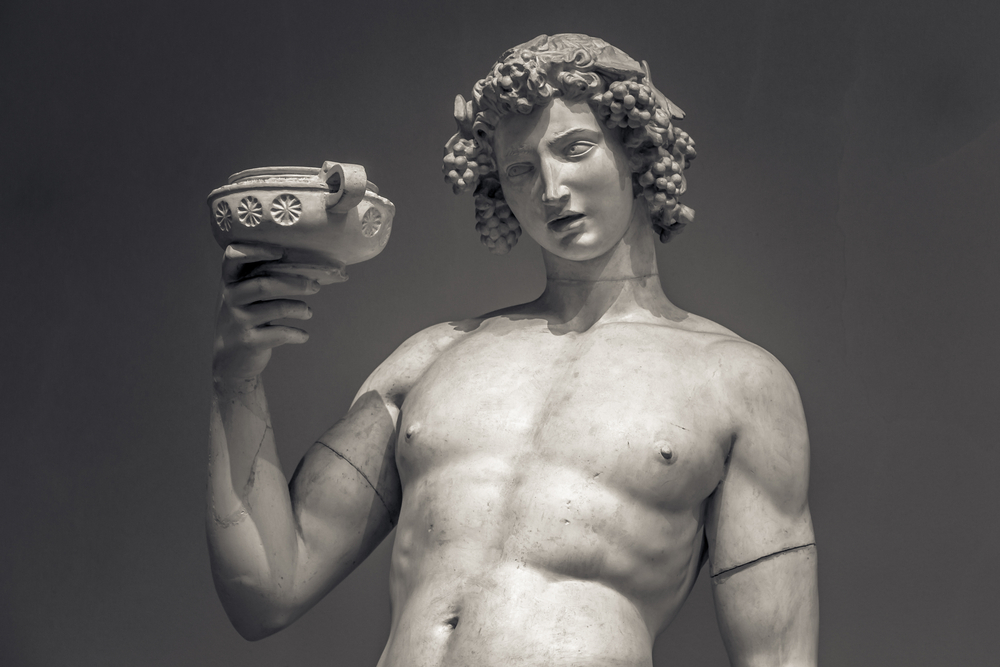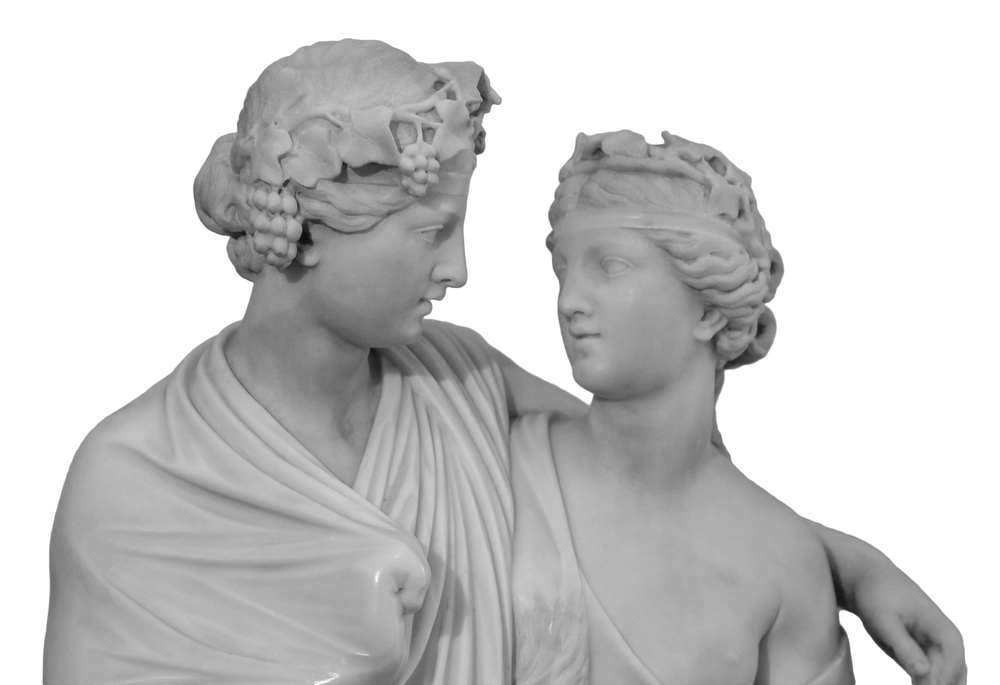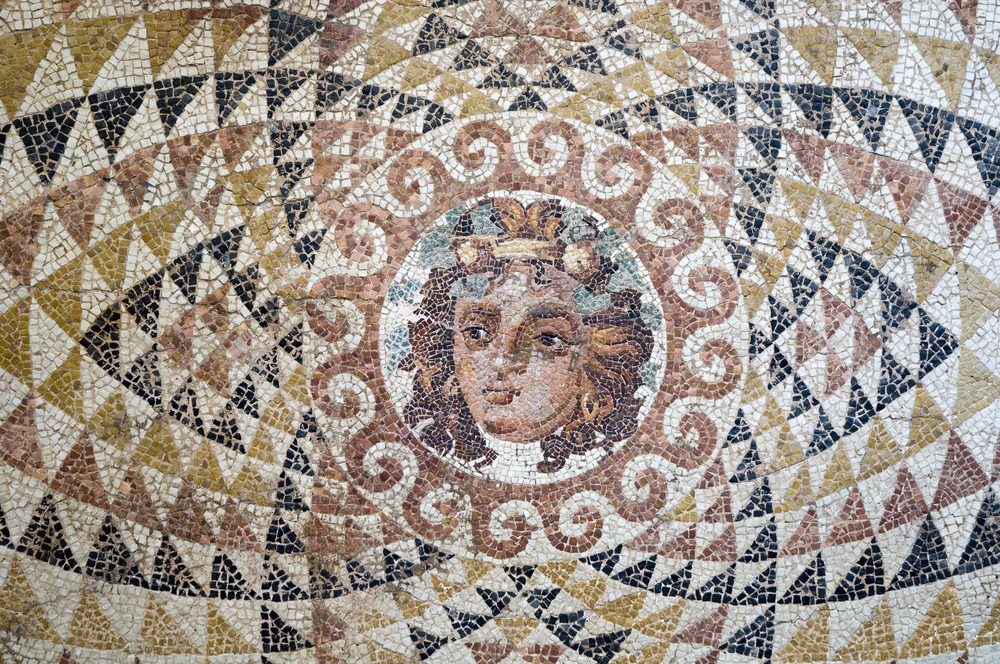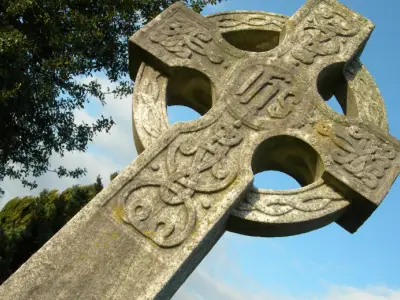Dionysus, the enigmatic god of wine, festivity, and ecstasy, is one of the most fascinating deities in Greek mythology. His story is woven with themes of joy, tragedy, and the power of transformation.
Whether you're a seasoned lover of ancient myths or new to the enthralling world of Greek gods and goddesses, Dionysus's tales offer insights into human nature, the forces of nature, and the divine. Let's delve into the world of Dionysus, exploring his myths, powers, symbols, and the intriguing questions surrounding his legend.
Jump to:
Who is Dionysus?

Dionysus, also known as Dionysos, is celebrated as the god of wine, pleasure, festivity, madness, and wild frenzy. He embodies the joy and despair of the human condition, illustrating the duality of life's experiences. Dionysus's story is about life's renewal, death's inevitability, and the potential for rebirth and change.
Dionysus’s Myths
Dionysus's myths combine divine adventure with themes of creation, transformation, and the balance between benevolence and retribution:
Dionysus's Descent into the Underworld
In one of his most famous myths, Dionysus ventures into the Underworld. He aims to retrieve his mother, Semele, and elevate her to a goddess on Olympus. This journey represents Dionysus's deep ties to themes of life, death, and resurrection, highlighting his unique ability to navigate between the living and the dead.
The Miraculous Birth of Dionysus
Dionysus's entry into the world is miraculous, setting the stage for his extraordinary life. Born from the union of Zeus, the sovereign of the gods, and Semele, a mortal, Dionysus's birth was marked by tragedy and divine intervention.
Hera's jealousy leads to Semele's demise when she beholds Zeus's true form, which is consumed by divine fire. In a bid to save his son, Zeus retrieved Dionysus from Semele's ashes and sewed him into his thigh, from which Dionysus was later born. This remarkable origin story highlights Dionysus's bridging of the mortal and immortal worlds, a testament to his resilience and the miraculous circumstances of his birth.
The Creation of Wine
One of Dionysus's most celebrated myths is the creation of wine, which has endeared him to humanity through the ages. After discovering the vine, Dionysus shared this gift with mankind, teaching them the art of winemaking.
This act secured his place as the god of wine and symbolised the joy and sorrow that wine brings, reflecting the dual nature of human experience. The creation of wine represents Dionysus's kindness and desire to spread happiness among mortals.
The Punishment of King Lycurgus
Another significant myth involving Dionysus is his encounter with King Lycurgus of Thrace, an opponent of the Dionysian cult. In retaliation for the king's refusal to acknowledge his divinity and his persecution of Dionysus's followers, the god inflicted madness upon Lycurgus, leading to his violent demise. This story serves as a cautionary tale about the consequences of denying the divine and highlights Dionysus's darker aspects related to vengeance and justice.
Dionysus's Powers
Dionysus holds power over the very essence of life, death, and the process of rebirth. His control over nature and agriculture, where he possesses the extraordinary capacity to make vines burgeon and thrive, showcases his role as a bringer of life and a nurturer of the natural world. Dionysus also exerts an influence over emotions and the human mind. He has the power to invoke states of ecstasy and madness among his followers, dissolving the barriers between real life and the mystical.
The most astonishing of Dionysus's powers is his capability for resurrection. By bringing the dead back to life, he symbolises the perpetual cycle of demise and renewal, highlighting the continuity of existence beyond the apparent finality of death. Together, these powers illuminate his connection to the fundamental aspects of the human experience—growth, change, and the enduring hope for rebirth.
Symbols of Dionysus
Dionysus's symbols each reflect different facets of his personality and powers:
- The Thyrsus: The thyrsus staff symbolises prosperity, fertility, and pleasure. Wrapped in ivy and capped with a pinecone, it represents the god's ability to bridge the gap between the human and the divine, merging the primal forces of nature with the cultivated world of humanity. The thyrsus is often depicted as a tool of enchantment, capable of transforming whatever it touches, much like the transformative power of Dionysus's wine.
- The Grapevine: Central to Dionysus's identity, the grapevine signifies the pleasures of wine and the processes of growth, decay, and rebirth inherent in the cycle of the seasons. It symbolises the god's control over nature's bounty and his gift of wine to humanity, serving as a source of joy and a medium for divine ecstasy and madness.
- The Leopard: The leopard's frequent presence in Dionysian imagery, whether as his mount or depicted on his clothing, symbolises the untamed, primal aspects of nature and humanity that Dionysus embodies and unleashes. The leopard represents strength, ferocity, and regal beauty that commands respect, mirroring Dionysus's wild and uncontrollable aspects.
- The Mask: Often associated with Dionysus's role in theatre and performance, masks represent the shifting nature of identity and the illusion of reality, central to Dionysian worship. They remind us of the god's connection to the transformative power of performance, where boundaries are blurred, and new perspectives are embraced.
- Wine Cups: Frequently depicted in scenes of Dionysian revelry, wine cups symbolise the god's dominion over wine and the communal and social aspects of his worship. Sharing wine from a common cup is a gesture of unity and fellowship, reflecting the god's role in breaking down social barriers and fostering community among his followers.
- Figs: Though less commonly noted, figs are associated with Dionysus as symbols of fertility, abundance, and the sweetness of life. Their inclusion in Dionysian iconography speaks to the god's broader domains of growth, regeneration, and the sensual pleasures of existence.
- Bulls and Serpents: Bulls, with their raw strength and fertility, and serpents, with their connotations of rebirth and transformation, are animals sacred to Dionysus. They underscore the god's connection to the cycles of nature and life, embodying the primal power and eternal renewal that Dionysus represents.
Dionysus's Relationships and Family

Dionysus's life was marked by his relationships with gods and mortals, and his adventures often blurred the lines between kindness and vengeance.
- Ariadne: Following her abandonment by Theseus, Ariadne found love with Dionysus. He discovered her on the island of Naxos, and they married. This union underscores Dionysus's compassionate nature and role as a god of solace and salvation. Together, they had several children, including Oenopion, who is said to have introduced wine-making to the people of Chios, embodying his father's legacy.
- Pentheus: Dionysus's interaction with Pentheus, his cousin, is a grim reminder of his capacity for wrath. Pentheus's refusal to acknowledge Dionysus's divinity and his prohibition of Dionysian worship in Thebes led to his demise. Feeling slighted and disrespected, Dionysus used his powers to drive Pentheus mad, leading to a tragic end at the hands of his mother and aunts, who were under the god’s spell.
- Semele: Dionysus's relationship with his mortal mother, Semele, is important in Greek mythology. His love and loyalty to her prompted his descent into the Underworld to rescue her spirit and elevate her to divine status on Mount Olympus.
- Zeus: Dionysus's bond with his father, Zeus, is marked by protection and a unique form of nurturing. After Semele's death, Zeus saved Dionysus by sewing him into his thigh until he was ready to be born. This extraordinary birth method underscores the special relationship between father and son, and Zeus's role in protecting Dionysus from Hera's jealousy, thereby ensuring his survival and eventual rise to Olympian status.
- Hera: The queen of the gods, Hera, had a complicated relationship with Dionysus, primarily marked by her jealousy and hostility towards him due to his origins as one of Zeus's illegitimate children. Her enmity led to various trials and tribulations for Dionysus throughout his life, including inciting the Titans to dismember him during his infancy—a myth that underscores the cyclic nature of death and rebirth inherent in Dionysus's worship.
- The Maenads: Dionysus's followers, particularly the Maenads (or Bacchae), were mostly women who abandoned their societal roles to roam the forests and mountains in ecstatic worship of him. These women, who were often depicted as frenzied and unrestrained, represent Dionysus's power to liberate and transcend the ordinary confines of society, embracing the wild and primal aspects of nature and the human psyche.
The Legacy of Dionysus

Dionysus's legacy is a testament to his character's complexity and influence. He was celebrated in the Dionysia, a festival that combined theatrical performances with religious ceremonies, showcasing the cultural and spiritual significance of his worship.
Dionysus's Influence on Culture and Art
The god of ecstasy and wine has inspired countless works of art, literature, and theatre, leaving an indelible mark on Western culture. His capacity to embody nature's creative and destructive aspects makes him a figure of enduring fascination and relevance.
Embracing Dionysus Today
Dionysus reminds us of the importance of balance, the value of embracing our wild side, and the transformative power of letting go. His myths encourage us to celebrate life's pleasures, acknowledge its sorrows, and always remain open to the possibilities of change and renewal.
Frequently Asked Questions About Dionysus in Mythology
Is Dionysus Considered an Evil God?
Dionysus is not considered an evil god. While his myths include themes of vengeance and retribution, they also showcase his benevolence, generosity, and the joy he brings to humanity through wine and festivity. Like many gods in Greek mythology, he embodies a complex nature that includes nurturing and destructive aspects.
What is Dionysus's Nickname?
Dionysus is often called "Bacchus," especially in Roman mythology, where his cult and festivals, known as Bacchanalia, were widely celebrated. Bacchus symbolises the god's dual nature of inducing joyous celebration and wild frenzy.
Did Dionysus Have Any Enemies?
Dionysus had a few enemies. One notable adversary was King Pentheus of Thebes, who denied Dionysus's divinity and opposed his worship. This conflict led to the tragic demise of Pentheus, illustrating the dangers of opposing a deity. Hera also harboured enmity towards Dionysus due to his lineage.
Are Bacchus and Dionysus the Same Person?
Bacchus and Dionysus refer to the same deity. Bacchus is the Roman name for Dionysus, the god of wine, ecstasy, and festivity. While there are slight variations in how the cultures viewed and worshipped him, the core attributes and myths surrounding the god remain consistent across Greek and Roman mythology.
What Gender is Dionysus?
In Greek mythology, Dionysus is traditionally depicted and referred to as male. However, his myths and the rituals associated with his worship often challenge traditional gender roles and norms, reflecting his nature as a god of transformation and subversion.
Why is Dionysus a Bull?
The bull is one of Dionysus's sacred animals, symbolising strength, fertility, and the primal forces of nature—all aspects Dionysus embodies. In some myths, Dionysus transforms into a bull or is associated with bull imagery, highlighting his connection to the animal's symbolic meanings.
What Stone Represents Dionysus?
The amethyst is often associated with Dionysus. Legend has it that the gemstone was created from clear quartz stained with the wine of Dionysus, symbolising sobriety and clarity amidst intoxication. The amethyst embodies the dual nature of Dionysus's gifts: joy and potential excess.
Did Dionysus Love a Man?
Dionysus had male lovers, reflecting the fluidity of his nature. One of his lovers was Ampelos, a satyr, whose tragic death inspired Dionysus to create the vine, according to some versions of the myth. This aspect of his mythology highlights Dionysus's themes of love, loss, and renewal.
What Colour Were Dionysus's Eyes?
While specific details about Dionysus's appearance vary across myths, ancient art often depicts him with dark eyes, mirroring the intoxicating and mysterious qualities of wine. However, as with many mythological figures, interpretations of his physical traits can differ.
Who Killed Dionysus?
According to myth, Dionysus was dismembered by the Titans under Hera's instigation. However, he was reborn, demonstrating his immortality and the themes of death and rebirth that permeate his myths. This cycle of death and rebirth is a central aspect of Dionysian worship.
Why Did the Titans Eat Dionysus?
The Titans ate Dionysus in a myth that symbolises the cycle of death and rebirth. Hera, jealous of Dionysus, lured the infant god with toys and had him torn apart by the Titans. Zeus struck the Titans with lightning, from which humanity was born, carrying a piece of the divine within them, symbolising the enduring legacy of Dionysus.
Recommended for you!
Best SellersDiscover the Intriguing World of Greek Mythology with Centre of Excellence
Our Greek Mythology Diploma Course is crafted to offer fascinating insights into the captivating tales of gods, goddesses, heroes, and monsters.
Why Centre of Excellence?
- Accessibility: We are committed to making learning accessible to all. Our courses are affordably priced to ensure that everyone has the opportunity to expand their horizons.
- Flexibility: Our courses are designed with your lifestyle in mind, allowing you to learn at your own pace and seamlessly integrate your educational pursuits into your daily life.
- Comprehensive Curriculum: We offer a broad spectrum of topics, delving into the rich and complex narratives of Greek mythology, catering to a wide range of interests and learning objectives.
- Dedicated Support: Enrolment includes personalised tutor support and access to a community of like-minded learners, providing a supportive and enriching educational environment.
Special Invitation
We are excited to offer our Greek Mythology Diploma Course at just £29 for a limited period, saving you over £100!













